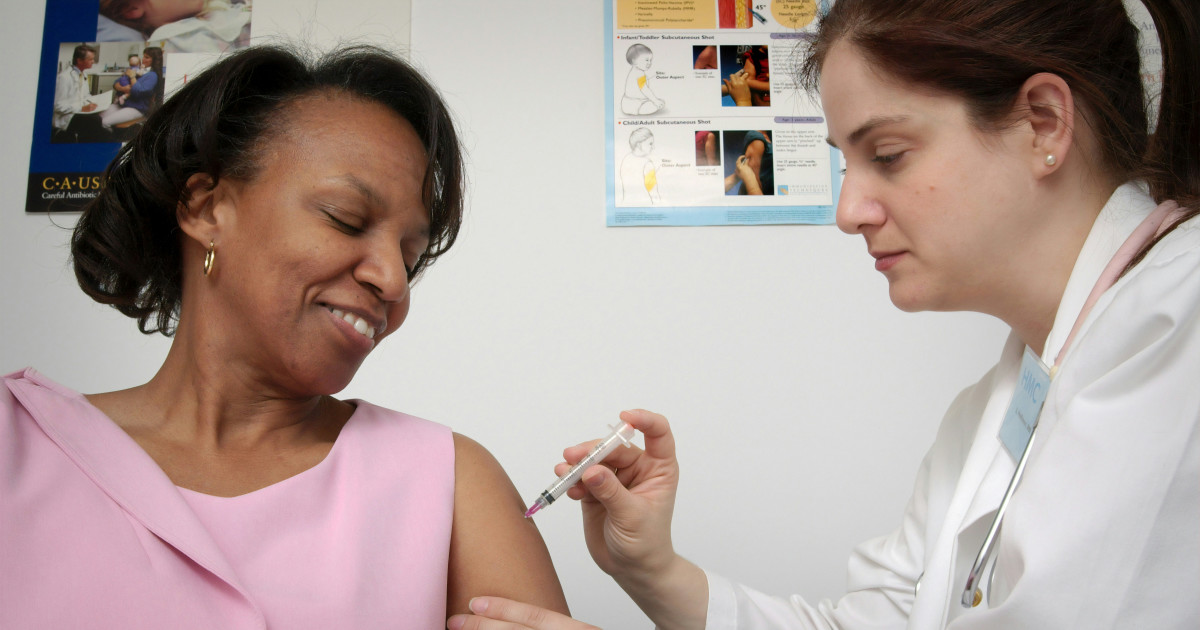Copyright Parade

Key Points A new study links two specific COVID-19 vaccines to increased cancer survival rates. COVID-19 vaccines are not considered cancer treatment or a cure. Doctors explain how COVID vaccines may help fight cancer, as well as other benefits to getting vaccinated and boosted against coronavirus. By now, you know that the COVID-19 vaccine is the best way to protect against severe COVID infections and reduce your chances of developing long COVID. You also know that the COVID-19 vaccine may have some mild and temporary side effects, including low-grade fever, body aches and fatigue. Researchers discovered another potential side effect that isn’t getting nearly as much attention/ What is it and why is it important? Here’s what you need to know. 🩺 SIGN UP for Parade’s health newsletter with expert-approved tips, healthy eats, exercises, news & more to help you stay healthy & feel your best self 💊 The Surprising, Newly-Discovered COVID Vaccine Side Effect There’s a potentially new incentive to get vaccinated and boosted: A University of Florida study in the journal Nature revealed a link between mRNA-based COVID vaccines and surviving cancer. Researchers examined clinical outcomes for more than 1,000 late-stage melanoma and lung cancer patients who were treated with a type of immunotherapy called immune checkpoint inhibitors. Immune checkpoint inhibitors block a protein that tumor cells create to deactivate immune cells, essentially training patients’ immune systems to kill cancer cells. Patients in the study who got either the Moderna or Pfizer mRNA COVID-19 vaccines within 100 days of beginning immunotherapy were more than twice as likely to survive after three years as patients who didn’t receive either jab. Further, patients whose tumors don’t respond well to immunotherapy were five times more likely to survive past three years if they had a Pfizer or Moderna mRNA COVID vaccine than patients who didn’t get vaccinated. Finally, these results held up even when researchers factored in variables like co-morbidities, disease severity and patients’ other medical conditions. Uh, this is pretty huge, but what does it all actually mean in practice? We asked infectious disease experts and oncologists to explain. Related: The Most Common COVID-19 Symptoms Doctors Are Seeing Right Now “This study opens an intriguing possibility: that modern mRNA vaccines—originally designed to prevent viral infections—may enhance the efficacy of cancer immunotherapy, particularly immune checkpoint blockade,” Dr. Zihai Li, MD., Ph.D., founding director of Pelotonia Institute for Immuno-Oncology, Klotz Memorial Chair in Cancer Research and professor at the Ohio State University College of Medicine, explains. “In other words, receiving an mRNA vaccine around the time of immunotherapy could ‘prime’ the immune system to respond more vigorously against cancer.” That surely sounds promising, but Dr. Li points out something significant in the research that’s important to keep in mind. “The findings are most directly relevant to solid tumors such as lung cancer and melanoma, where they have the most data, and that checkpoint blockade is already a mainstay of treatment,” he says. “However, much remains to be learned … In patients, the only mRNA vaccines they looked at were mRNA vaccines against SARS-CoV2. If confirmed, these findings could reshape how we integrate vaccines and immunotherapy, transforming preventive vaccines into therapeutic allies against cancer.” With all that said, please keep in mind that this isn’t a cure. “Current clinical guidelines, including those from the American Society of Clinical Oncology (ASCO), do not recognize direct anti-cancer effects as a rationale for COVID-19 vaccination in cancer patients,” Dr. Steven Goldberg, MD, MBA, chief medical officer at HealthTrackRx, advises. “The primary benefit of COVID-19 vaccination in this population is the prevention of COVID-19 and its complications.” Related: This Surprising Habit Could Make Your Vaccine Less Effective Can Other Vaccines Help Fight Cancer? The study showed a lot of promise in terms of two specific types of mRNA COVID vaccines in the fight against certain cancers. Could other vaccines show that benefit too? According to experts we spoke with, it’s too soon to tell just yet. “We will have to study if other mRNA vaccines could have the same type of benefit, or if this is only seen in mRNA-based COVID-19 vaccines,” Dr. Jeff Yorio, MD, medical oncologist and research site leader at Texas Oncology, tells Parade. “Pneumonia vaccines and flu vaccines, which are not mRNA-based, did not change the response to immunotherapy. This was a retrospective study so more work will need to be done to verify the results, but it is definitely a promising finding.” “This study just looked at mRNA based COVID vaccines, but it did look at different manufacturers,” Dr. S. Wesley Long, MD, Ph.D., associate professor of clinical pathology and genomic medicine at Houston Methodist, concurs. “We don’t yet know if the same benefits might extend to other mRNA vaccines, or vaccination in general.” That said, certain other vaccines have shown some efficacy in studies, according to Dr. Goldberg: “The Bacillus Calmette-Guérin (BCG) vaccine, for example, is an established immunotherapy for non-muscle invasive bladder cancer and is known to induce ‘trained immunity,’ a process that enhances the responsiveness of the immune system to tumor cells.” “Vaccines such as HPV and hepatitis B are specifically designed to prevent virus-induced cancers, but COVID-19 vaccines are not in this category.” “Vaccines like influenza and pneumococcus have also been studied for their potential to modulate immune responses in cancer patients, but there is no consistent evidence that they directly inhibit tumor growth or metastasis.” Related: These Are the Vaccine Side Effects You Should Worry About, According to Infectious Disease Experts What Are Other Benefits of the COVID Vaccine? Let us remind you: It is prime season for COVID, colds and flu. Protect yourself! “The best evidence supports that COVID-19 vaccination prevents severe disease, hospitalization and death,” Dr. Long says. “It can also decrease your risk of developing long COVID, prevent infection and may reduce viral load by shortening the length of illness and symptoms if you are infected.” Also, just to reiterate one more time: No, the COVID vaccine doesn’t cause cancer, despite some non-science-backed conversations in the news right now. “So far, we have not seen any evidence that COVID-19 vaccines have caused an increase in cancer rates,” Dr. Yorio says. “During the 2020 COVID-19 pandemic, there was a big drop in cancer incidence because people were not getting screened as frequently or going to doctors.” There was an expected rise in the next few years in cancer incidence due to the lack of diagnosis in 2020, he explains. “Again, this was not due to vaccines but rather a lack of testing during the pandemic. A study like this is actually showing a potential survival benefit to the COVID-19 vaccine in patients with advanced cancer. And, while there are patients who do have some side effects from vaccines, the COVID-19 vaccine is still thought to be a very safe vaccine overall.” Up Next: Sources:



